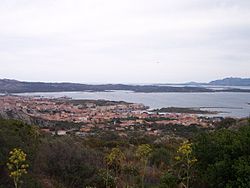La Maddalena
La Maddalena
Madalena | |
|---|---|
| Comune di La Maddalena | |
 | |
| Coordinates: 41°13′N 09°24′E / 41.217°N 9.400°E | |
| Country | Italy |
| Region | Sardinia |
| Province | Tempio-Pausania (OT) |
| Frazioni | Moneta, Stagnali |
| Government | |
| • Mayor | Luca Carlo Montella |
| Area | |
• Total | 49.37 km2 (19.06 sq mi) |
| Elevation | 27 m (89 ft) |
| Population (30 November 2014)[1] | |
• Total | 11,407 |
| • Density | 230/km2 (600/sq mi) |
| Demonym | Maddalenini |
| Time zone | UTC+1 (CET) |
| • Summer (DST) | UTC+2 (CEST) |
| Postal code | 07020, 07024 |
| Dialing code | 0789 |
| Patron saint | Santa Maria Maddalena |
| Saint day | July 22 |
| Website | Official website |
La Maddalena (Gallurese: Madalena or La Madalena, Template:Lang-sc) is a town and comune located on the island with the same name, in northern Sardinia, part of the province of Olbia-Tempio, Italy.
The town

La Maddalena is the largest town in the Maddalena archipelago, just 2 kilometres (1 mile) from the northeastern shore of Sardinia and sitting in the Straits of Bonifacio, between it and Corsica.
The focal-point of pedestrian activity is found around Piazza Umberto I (formerly known as Piazza Comando-the older generation of natives in town still commonly refer to the piazza by its original name). There is an adjacent via (Garibaldi) that connects the port (Banchina Commerciale I) facing the Island of Santo Stefano and Piazza Umberto I with city hall. Via Garibaldi is surrounded by commercial shops, restaurants, and bars.
La Maddalena now derives much of its income from tourism. The only method of traveling to La Maddalena is by boat, with car ferries travelling from nearby Palau and from the Italian mainland.
The natives of La Maddalena speak a Sardo-Corsican dialect known as Maddalenino. A comprehensive survey on the dialect, including a concise history of the island and its people, can be found in Renzo De Martino's Il dizionario maddalenino: Glossario etimologico comparato
The island
The island of Maddalena is renowned for its beaches; it is characterized by rocky granitic terrain and has some ancient fortifications. Spalmatore and Bassa Trinita are two popular beaches. It is connected by causeway with the nearby island of Caprera, famous as the residence of the Italian revolutionary Giuseppe Garibaldi.


History

La Maddalena has undergone many name changes: the Romans named it Ilva, Fussa and Bucina and in the Middle Ages the island was known as "Bicinara" before being given the name of Santa Maria Magdalena in the 16th century. After this it finally became known as La Maddalena.
The Maddalena archipelago is known from archaeological evidence to have been occupied in prehistoric times, but its written history begins with the Roman Empire.
After the fall of the Western Roman Empire the islands were completely abandoned until the 12th century, when they were chosen by Benedictine monks founding small communities there. The islands were the object of a dispute between the Republics of Pisa and Genoa in the 12th century.
In 1584 all the monasteries on the islands were destroyed by one of the Ottoman raids. In the 17th century shepherds began to bring their flocks to the islands in the winter months.
Its location in the Strait of Bonifacio, through which much maritime traffic must pass, has turned the archipelago into a strategic military position. In 1767 it was occupied by the Savoy-Piedmontese. The nucleus of the present town of La Maddalena emerged then.
In 1793 a French expedition, in which Napoleon Bonaparte took part, unsuccessfully tried to occupy the island. It was the first combat experience of Napoleon Bonaparte. During all the Napoleonic Wars Admiral Horatio Nelson used the archipelago of La Maddalena as a base for his fleet in actions against the French.
A base was established here by the Italian Regia Marina (Royal Navy) in 1887. In 1943, during World War II, Benito Mussolini was briefly held prisoner here.
From 1972 through 2008, there was a U.S. Naval Support Activity base as well as a NATO base on the nearby island of Santo Stefano. The NATO base housed an Italian Navy barracks and it served as the home port for several US Navy submarine tenders over the years, ending with the departure of the USS Emory S. Land, which set sail for its new home port of Bremerton, Washington. The US Naval Support Activity officially closed in January 2008, ending the 35 year US presence in La Maddalena.
During the period in which the American military had a presence on the island, it was twice used as a repair base for submarines after undersea collisions. In 1977 USS Ray collided with a coral reef off Tunisia and suffered damage to the sonar dome and cracking to the hull. Ray had immediate repairs here, then made a surface transit back to the US. On 25 October, 2003 USS Hartford ran aground with sufficient force to substantially damage its rudders, sonar and electronics.[2]
La Maddalena now lends its name to a National Park located in the archipelago.
The 35th G8 Summit, chaired by Prime Minister Silvio Berlusconi, was going to be held in La Maddalena in 2009, but later it was moved to L'Aquila.
Twin towns
References
- ^ "Popolazione Residente al 1° Gennaio 2018". Italian National Institute of Statistics. Retrieved 16 March 2019.
- ^ Mahony, Edmund H. "USS Hartford Involved In Collision In Strait Of Hormuz," Hartford Courant. March 21, 2009.
External links
- The Italian Tourist Board
- The British National Archives
- Parco Nazionale dell'Arcipelago di La Maddalena
- History of La Maddalena
- Naval Activity in La Maddalena
- The Napoleon Series
- Arcipelago di La Maddalena National Park
- Holiday in Maddalena





